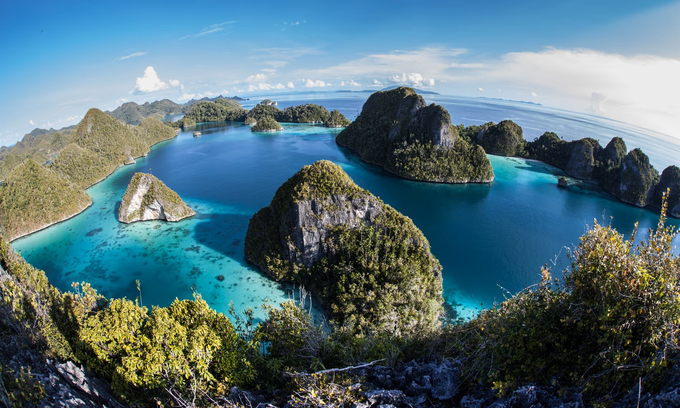May 21, 2025 | 03:28 GMT +7
May 21, 2025 | 03:28 GMT +7
Hotline: 0913.378.918
May 21, 2025 | 03:28 GMT +7
Hotline: 0913.378.918

A lagoon surrounded by limestone islands in Raja Ampat, Indonesia. Ocean acidification is getting worse globally, say experts. Photo: Getty.
Industrial civilisation is close to breaching a seventh planetary boundary, and may already have crossed it, according to scientists who have compiled the latest report on the state of the world’s life-support systems.
"Ocean acidification is approaching a critical threshold", particularly in higher-latitude regions, says the latest report on planetary boundaries. "The growing acidification poses an increasing threat to marine ecosystems".
The report, from the Potsdam Institute for Climate Impact Research (PIK), builds on years of research showing there are nine systems and processes – the planetary boundaries – that contribute to the stability of the planet’s life-support functions.
Thresholds beyond which they can no longer properly function have already been breached in six. Climate change, the introduction of novel entities, change in biosphere integrity and modification of biogeochemical flows are judged to be in high-risk zones, while planetary boundaries are also transgressed in land system change and freshwater change but to a lesser extent. All have worsened, according to the data.
Stratospheric ozone depletion has remained stable, however, and there has been a slight improvement in atmospheric aerosol loading, the research says.
At a briefing outlining the findings, Levke Caesar, a climate physicist at PIK and co-author of the report, said there were two reasons the levels of ocean acidification were concerning.
"One is [that] the indicator for ocean acidification, which is the current aragonite separation state, while still being in the safe operating space, is approaching the threshold of transgressing the safe boundary", Caesar said.
"The second is that there are actually several new studies that were published over the last years that indicate that even these current conditions may already be problematic for a variety of marine organisms, suggesting a need to re-evaluate which levels can actually be called safe".
Ocean acidification was getting worse globally, with the effects most pronounced in the Southern Ocean and the Arctic Ocean, she added.
Ocean acidification is the phenomenon of increasing acidity (decreasing pH) in ocean water due to the absorption of atmospheric CO2. The process not only harms calcifying organisms, potentially leading to food web breakdown, but also reduces the ocean’s efficiency in acting as a vital carbon sink.
"This illustrates the connection between ocean acidification … and biosphere integrity", Caesar said. "Indeed, one of the main messages of our report is that all nine planetary boundaries are highly interconnected.
This means that any human perturbation of the global environment that we observe at the moment… cannot be addressed as if they were separate issues, which is how it is at the moment primarily handled. Because this type of approach ignores that the components of the Earth system constantly interact forming a large network where changes in one area affect the others".
Planetary boundary science was pioneered in 2009 by Johan Rockstrom, the director of the PIK, and others. In that research and two subsequent reports, the researchers identified and quantified boundaries relating to climate change, biosphere, land system change, freshwater change, biogeochemical flows, ocean acidification, atmospheric aerosol loading, ozone layer depletion and the introduction of novel entities, such as synthetic chemicals, to the environment.
The transgression of boundaries in each of those areas risks disrupting the stability, resilience and liveability of the state of the planet that has persisted for the past 12,000 years and that has allowed the rise of complex human civilisation.
The report, which came a year after the last, is the first of what will now be annual "planetary health checks" published by PIK, Rockstrom said.
"We recognise that the planet’s health … is at such risk today that we in science must also now step up and step right out in to the uncomfortable zone and say that we are now committing ourselves to produce every year a scientific measuring of the entire health assessment – a risk assessment – across all the planetary boundaries", he said. "This is much more than science, this is science for change".
Unlike previous iterations of PIK’s planetary boundaries research, the report does not appear in an academic journal but is instead written and formatted for a popular audience. Rockstrom and his colleagues said the findings were based on peer-reviewed science.
(The Guardian)

(VAN) In 2024, over 295 million people across 53 countries and territories faced acute hunger—an increase of almost 14 million people compared to 2023, while the number of people facing catastrophic levels of hunger reached a record high.

(VAN) World Environment Day 2025 (June 5) carries the theme 'Beat Plastic Pollution' continuing to emphasize the global urgency of addressing the plastic waste crisis.

(VAN) This was the assessment shared by experts at the workshop titled 'Assessing the Role and Potential of Low-Emission Rice Production Systems in Vietnam,' held on the morning of May 19.

(VAN) Cai Rong Port is the fisheries control center of Quang Ninh, helping to monitor fishing vessels, combat IUU fishing, and remove the EC's 'yellow card'.

(VAN) The German Agricultural Society (DLG) explores the possibility of establishing a mechanization service center in Vietnam’s Mekong Delta to support farmers in accessing and utilizing advanced machinery.

(VAN) On May 16, the Department of Water Resources Management, in collaboration with the Food and Agriculture Organization of the United Nations (FAO), held a signing ceremony for the GEF-8 project document.

(VAN) Food safety, mechanization, vocational training, and market opening are key areas of cooperation expected between the Vietnamese Government and the Federal Republic of Germany.